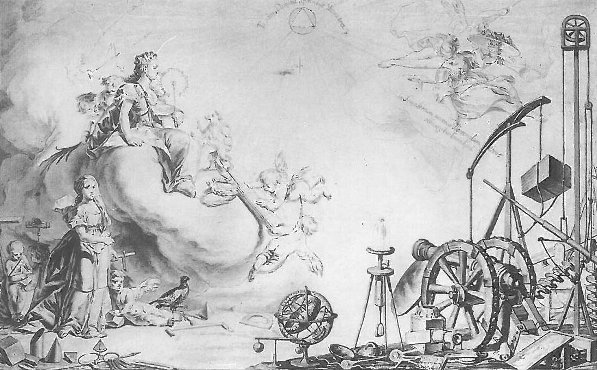Journal

Johann Quirin Jahn, Allegory of the technical disciplines, 1767
From the Image Index of Political Iconography at the Warburg-Haus
Die Künste im technischen Zeitalter II
Schwerpunktthema 2020
With the establishment of the Kulturwissenschaftliche Bibliothek Warburg and the development of a set of instruments that takes art and images seriously as bearers of social, cultural and political significance across times and spaces, the scholars around Aby Warburg in Hamburg established art history as a modern science of cultural studies. For Warburg, as a technophile, the view of cultural forms of expression was always also one of the relationship between art, media and technical knowledge, up to the present. This interdisciplinary interest provides the occasion for the two-year focus topic at the Warburg-Haus to investigate the topicality of Warburg’s methodological heritage and, focusing on the relationship between art and technology, to take up innovative impulses and methodological reflections that continue to inspire to this day.
In the first half of 2020, the Warburg-Haus lectures will focus on Hans Blumenberg’s work on technology and art, on the occasion of the great philosopher’s centenary this year; on the architectural design of subway stations in Europe in the second half of the 20th century as a central feature of the infrastructural appearance of modern metropolises; and, in the lecture of this-year’s holder of the Warburg professorship, on pictorial worlds of visual experiences in Hamburg and German painting as well as Italian art of the late Trecento and early Quattrocento (Birgit Recki, Frank Schmitz, Christopher Wood). The lectures are framed by a program of cooperation events. In April, in cooperation with the Kunsthaus Hamburg, the exhibition Ah humanity! of filmmakers Véréna Paravel and Lucien Castaing-Taylor from Harvard University’s Sensory Ethnography Lab shall provide the occasion for a curator’s guided tour of the exhibition followed by a panel discussion at the Warburg-Haus. In May, thanks to a cooperation with Flexibles Flimmern – The mobile cinema, a film screening of Paravel/Castaing-Taylor’s major work Leviathan (2012) is planned in the reading room, and in June, in cooperation with the Hamburgische Wissenschaftliche Stiftung and publishing house Klett-Cotta, an evening with Ernst Kantorowicz is to take place on the occasion of the publication of the German edition of Robert E. Lerner’s biography of the internationally influential historian and medievalist, with translator Thomas Gruber, Villa I Tatti Florence, Barbara Picht, ZfL Berlin, and Christopher Wood, New York University.
Die Künste im technischen Zeitalter II